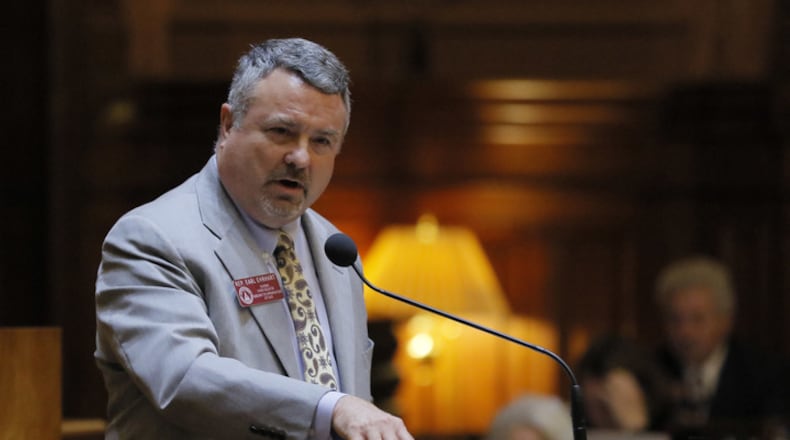Shortly after the 2018 legislative session ended, a lobbying firm announced the hiring of a longtime Powder Springs Republican lawmaker who had decided he would not seek another term after serving for 30 years.
Taylor English Decisions said then-state Rep. Earl Ehrhart would be the company's new CEO. Soon after, the firm was hired by the Atlanta Braves to persuade the Legislature to expand the state's gambling laws to allow sports betting.
Ehrhart was instrumental in connecting Cobb County officials with the Braves in 2013, leading to the team's move from Atlanta's downtown to the Cobb Parkway area. His wife Ginny, who replaced him in the state House this year, now serves on a study committee considering whether to push legislation to permit sports betting.
Such cozy relationships between lawmakers or ex-lawmakers, lobbyists and big company interests are commonplace at the Capitol.
While Ehrhart isn’t legally allowed to register as a lobbyist until January, outgoing, longtime lawmakers are frequently hired to help attract clients to lobbying firms during the interim between their time in office and when they can formally sign up.
Even before they are eligible to formally lobby, ex-lawmakers have been known to show up during the General Assembly session, often getting onto the House and Senate floor to schmooze with former colleagues. The Senate president and House speaker often call them out by name for recognition. But they are not supposed to lobby for legislation.
About 30 former lawmakers lobby at the Capitol, many of them with close ties to state leaders. Former Senate leader Pete Robinson, one of the Capitol’s top lobbyists, for instance, served on Gov. Nathan Deal’s transition team and helped lead his judicial nominating commission.
Trip Martin, whose firm GeorgiaLink Public Affairs Group represented the Braves for years, has three former lawmakers as partners.
Ehrhart referred questions for this article to his work colleague, Trey Paris, managing director for Taylor English Decisions, who said the former lawmaker has not violated any state statute.
“Earl Ehrhart has never advocated for or against a bill in Georgia through a former legislative colleague,” he said. “And Earl is only a consultant to the firm as the CEO, which is completely within the law. That’s about as plainly as I know how to put it to you.”
State law requires lawmakers wait at least one year after their term ends before they register with the state ethics commission, which means Ehrhart is not eligible until January.
While nothing Ehrhart has done violates the state’s ethics law, ethics watchdogs said it doesn’t look good.
“This is one of the things that erodes public trust in politics and government,” said William Perry, who runs Georgia Ethics Watchdogs. “People end up making a lot of money off of their public service to where public service seems now to be a stepping stone to financial gain as opposed to serving people.”
Committees in both the Senate and House this summer and fall have been looking at ways to expand gambling and gaming in Georgia, ranging from sports betting to casinos. The 15-member House committee — which will meet for the first time next week — includes Ehrhart's wife.
Though he serves as CEO of Taylor English — and the firm is lobbying on behalf of businesses including the Braves, the state trial lawyers association and gun-rights group Georgia Carry — it does not mean Ehrhart is engaging in lobbying activity, said Robert Lane, the ethics commission’s lawyer.
“Lobbying behavior is very, very broad,” he said. “There are a lot of exceptions as to whether you have to register as a lobbyist or not.”
Plus, Lane said, a CEO doesn’t typically have to engage in lobbying activity when leading a firm.
“You have minions who go out and carry the weight of lobbying for clients,” Lane said. “So a CEO could say, ‘I’m not being paid directly by a client to lobby on their behalf, my minions are.’”
Atlanta sports franchises are pushing Georgia lawmakers behind the scenes to allow for the expansion of the state’s gambling laws.
Lawmakers are considering allowing Georgians to vote on a constitutional amendment that could legalize the construction of casinos, bring horse racing to the state or allow sports betting. Various gambling bills have struggled to gain traction in the Georgia Legislature in recent years.
The House gambling panel was created this summer to study the potential economic benefits of expanding gambling, which supporters say would bring thousands of jobs and pump hundreds of millions of dollars into the Georgia Lottery-funded HOPE scholarship.
Casino gambling reported record numbers last year but the thoroughbred horse racing industry is shrinking. Experts say sports betting's impact on state revenue would be minimal.
State Sen. Brandon Beach, an Alpharetta Republican who is leading the Senate panel studying gambling, said he's not aware of Ehrhart doing any lobbying.
“He’s not approached me or talked to me at all (about sports betting),” Beach said. “And he has not been in either of the two meetings I’ve had with the Atlanta Braves.”
In the four years leading to Ehrhart’s decision to retire, the Braves donated $3,000 to his campaign. His wife received $500 from the Braves shortly after she entered the race to replace him. Beach’s campaign has received $2,000 in contributions from the Braves during that period.
The organization has contributed about $100,000 to state candidates in the past five years as the push for increased gaming has intensified. More than $29,000 of those campaign contributions were made since the May 2019 U.S. Supreme Court ruling that allowed sports betting in all states.
Ehrhart also was appointed by Deal last year to serve on the Atlanta regional transit board, which oversees transportation funding and construction in the 13-county metro region.
Perry, the ethics watchdog, said state law is written in a way that allows lawmakers to benefit financially even before he or she is eligible to lobby.
“These folks can still consult on lobbying without directly lobbying and it’s essentially the same thing,” he said. “It’s the reason why Georgia ethics laws are the worst in the nation. You have good-old-boys and good-old-girls looking out for each other.”
What is a lobbyist?
State law defines a lobbyist this way: “Any natural person who… receives or anticipates receiving more than $250.00 per calendar year in compensation …specifically for undertaking to promote or oppose the passage of any legislation by the General Assembly.”
Can former lawmakers become lobbyists?
Yes. But state law says they and many other public officials “shall be prohibited from registering as a lobbyist or engaging in lobbying … for a period of one year”after leaving the state.
About the Author
Keep Reading
The Latest
Featured




